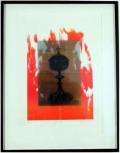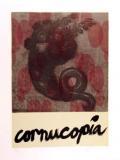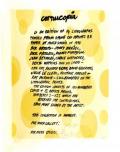enquiries@muka.co.nz
ROMEO, Giuseppe
Nationality: Australia
Website: Website
Australian artist
Born in Melbourne 1958
Lives and works in Macedon, Victoria, Australia
God's were the lambs and meadows. Whose are the cars and smog?
Whereas the religions of old doused physical fires and raised spiritual ones, mass cultural commercialism values the former and neglects the latter. The Unabomber* would have a return to pastoral tranquillity. The problem is that lambs and meadows are redundant symbols in the contemporary urban environment.
Symbols are a language of convention. Conventions are a reflection of the needs of a society. As society's needs change and priorities shift, old conventions and symbols become hollow shells.
Walking through the alleyways of Melbourne and the villages of his parents? birth, Giuseppe Romeo has been window-shopping for symbols. He comments that it is always the best things which are discarded. Literally and metaphorically he sifts through this rubble in an attempt to reconcile the ugly and the banal with a hunger for the sacred in the everyday.
What started out as playful documentation (Penisaurus ? an allegory of events following the birth of my grandfather) and meaningful graffiti has become a more urgent personal search. The rawness of natural powers cannot be contained in half-known symbols: alternatives have to be found.
Romeo is puzzled and elated to witness the anomaly of age-old superstitions ? the Evil Eye, bleeding statues, stigmata, faith healing ? at work in a contemporary urban setting. He appreciates these, not out of personal faith, but out of a more abstract sense of the importance and power of ritual and symbol. It is a sense of this power which he tries to communicate to his audience by way of sanctification ? sanctification of even the ugly, the banal, the seedy.
The human mind and imagination possess powers of transformation which not only make life bearable in near impossible conditions, but which invest meaning into the present existence. The purpose of human life is itself a product of human creativity. A recent installation expressed this most powerfully.
Over the years Romeo has collected an assortment of his grandfather's treasures. Frustrated and confined to the boundaries of his house following retirement, his grandfather had started to collect oddments of stones, pieces of glass and bits of tightly packed cardboard. The collection was housed in a boarded-up garden shed where a doll's head on a long nail was installed as a ritual guard. Romeo set this sum of a life against a dripping red background and added the burnt effigy of a church-house as well as a popcorn container. An overhanging black sun threatened the whole.
In such rubble and personal anguish lie both a warning and an opportunity for renewal: redefining the sacred and integrating it into contemporary existence is not a luxury, it is essential to the survival of the human soul.
*American terrorist targeted corporations and individuals involved in research, especially in the field of genetics.
Born in Melbourne 1958
Lives and works in Macedon, Victoria, Australia
God's were the lambs and meadows. Whose are the cars and smog?
Whereas the religions of old doused physical fires and raised spiritual ones, mass cultural commercialism values the former and neglects the latter. The Unabomber* would have a return to pastoral tranquillity. The problem is that lambs and meadows are redundant symbols in the contemporary urban environment.
Symbols are a language of convention. Conventions are a reflection of the needs of a society. As society's needs change and priorities shift, old conventions and symbols become hollow shells.
Walking through the alleyways of Melbourne and the villages of his parents? birth, Giuseppe Romeo has been window-shopping for symbols. He comments that it is always the best things which are discarded. Literally and metaphorically he sifts through this rubble in an attempt to reconcile the ugly and the banal with a hunger for the sacred in the everyday.
What started out as playful documentation (Penisaurus ? an allegory of events following the birth of my grandfather) and meaningful graffiti has become a more urgent personal search. The rawness of natural powers cannot be contained in half-known symbols: alternatives have to be found.
Romeo is puzzled and elated to witness the anomaly of age-old superstitions ? the Evil Eye, bleeding statues, stigmata, faith healing ? at work in a contemporary urban setting. He appreciates these, not out of personal faith, but out of a more abstract sense of the importance and power of ritual and symbol. It is a sense of this power which he tries to communicate to his audience by way of sanctification ? sanctification of even the ugly, the banal, the seedy.
The human mind and imagination possess powers of transformation which not only make life bearable in near impossible conditions, but which invest meaning into the present existence. The purpose of human life is itself a product of human creativity. A recent installation expressed this most powerfully.
Over the years Romeo has collected an assortment of his grandfather's treasures. Frustrated and confined to the boundaries of his house following retirement, his grandfather had started to collect oddments of stones, pieces of glass and bits of tightly packed cardboard. The collection was housed in a boarded-up garden shed where a doll's head on a long nail was installed as a ritual guard. Romeo set this sum of a life against a dripping red background and added the burnt effigy of a church-house as well as a popcorn container. An overhanging black sun threatened the whole.
In such rubble and personal anguish lie both a warning and an opportunity for renewal: redefining the sacred and integrating it into contemporary existence is not a luxury, it is essential to the survival of the human soul.
*American terrorist targeted corporations and individuals involved in research, especially in the field of genetics.




